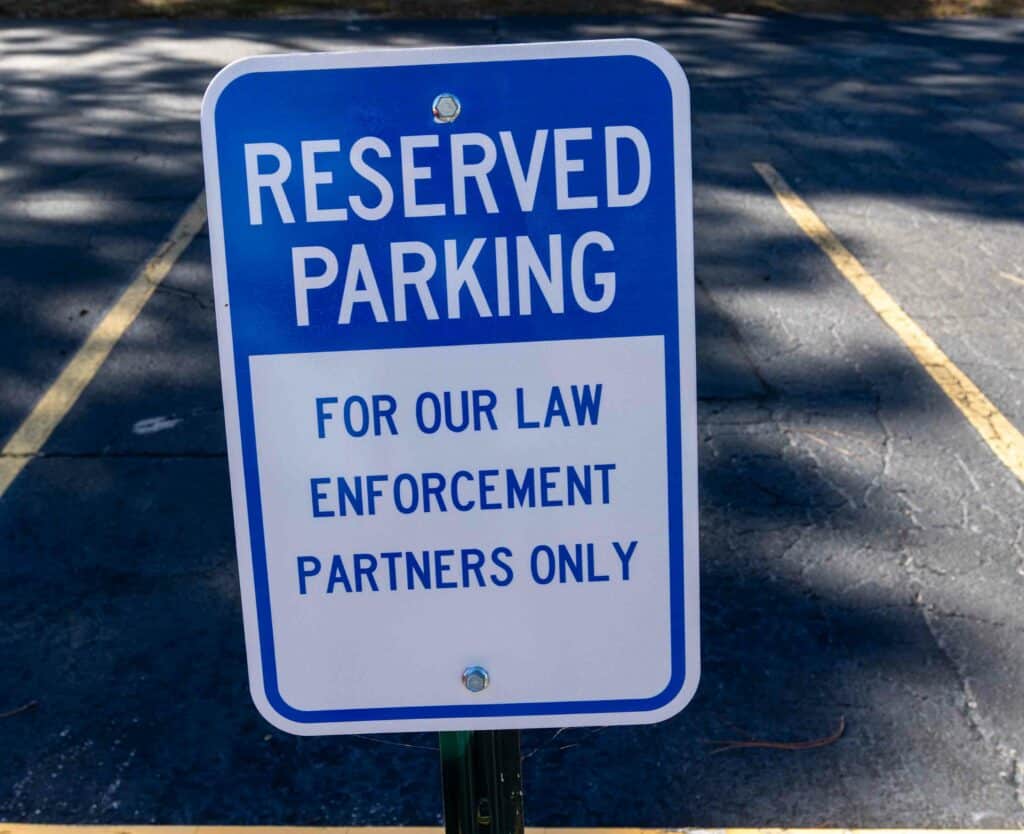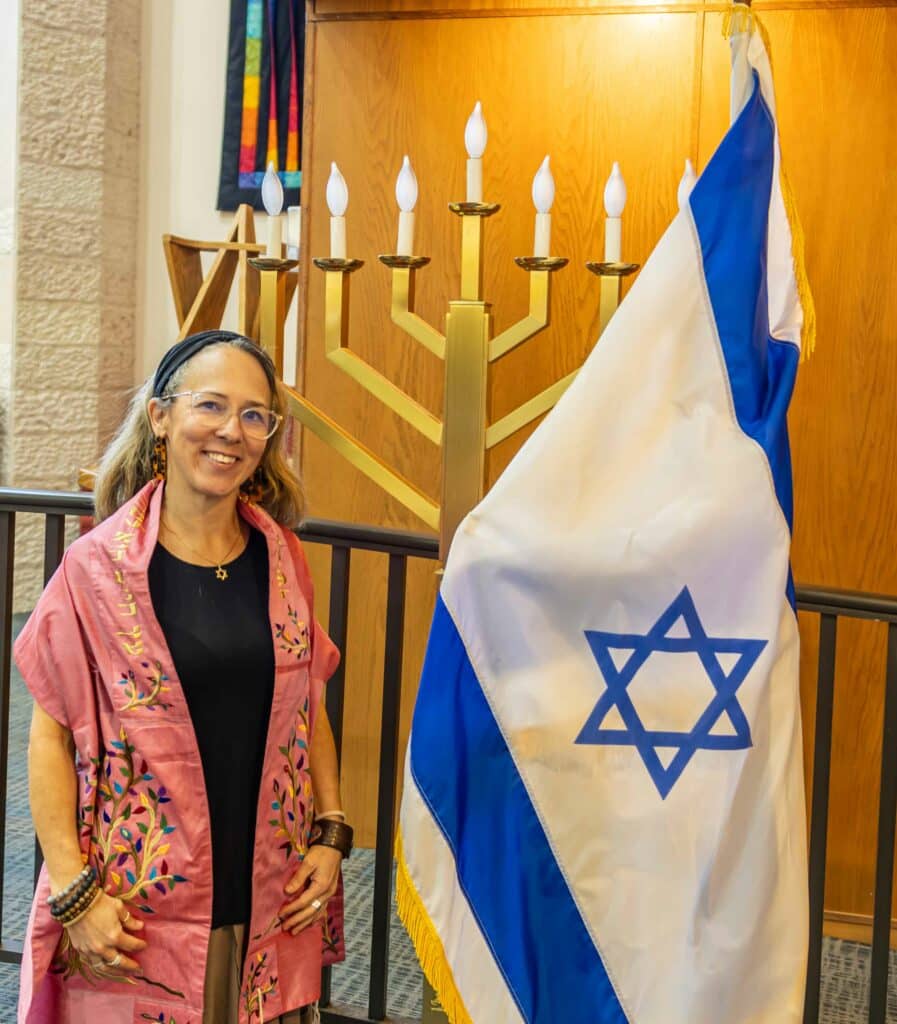It’s never a good thing when the phone rings in the middle of the night. And it’s even worse when the call is from your terrified daughter, who is half a world away. This was the frightening scenario that Spring Hill Rabbi Jen Goldberg was faced with during the early morning hours of Oct. 7, 2023.
Goldberg’s eighteen-year-old daughter, Mara, is a student studying for a year in Jerusalem. That morning, she called her mother, scared and crying, saying that the missile warning sirens were going off, and she was headed to the bomb shelter. Just four hours later, Mara called again with the frightening news that Jerusalem was undergoing another wave of warnings, terrorist attacks were occurring all over Israel, and no one was sure what was happening. It was the morning of Shabbat, a day that was supposed to be a day of peace and worship for the Jewish community.
Mara’s phone calls came just as the world was waking up to the news that Hamas militants had crossed from the Gaza territory into Israel and slaughtered hundreds in Israeli border towns. With savage brutality not seen since the days of ISIS, the terrorists murdered men, women, and children in dozens of Israeli border towns while long-range rockets rained down on other Israeli cities. For hours, Israeli citizens in primarily rural areas up and down the Gaza border had waited and prayed for help from an Israeli army that would come too late.
Over two hundred Israelis were kidnapped by Hamas terrorists and taken into Gaza, including many children. Around 1400 more were brutally slaughtered in their villages, often in front of their family members. It became quickly apparent that the slaughter of Israelis was the worst since the Holocaust. Just as America once experienced a deadly attack on a Sunday at Pearl Harbor, Israel was now experiencing their Pearl Harbor, or more accurately, their 9/11.
Fortunately for Mara and others in Jerusalem that morning, the Israeli Iron Dome system did what it was designed to do and intercepted the inbound missiles before they could deliver their deadly payloads. Other cities had not been so lucky.
These were the moments that marked the beginning of events that would quickly lead to Israel’s formal declaration of war on Hamas and the country’s effort to eradicate the terrorist group.
Antisemitism Takes Root
It was against this backdrop that both veiled and blatant anti-Semitic threats and demonstrations began appearing around the world, across the US, and right here in Florida.
In the days following the initial attack, unrest spread across the US, first on campuses and then in cities. Thousands of people, mostly young, filled the streets and protested what they claimed was an Israeli campaign of genocide against the Palestinian people living in Gaza. Hamas leaders seized on the protests as a propaganda opportunity and called for a worldwide “day of rage” the following week. The day saw anger toward Israel stoked by both foreign and American community leaders, as well as some high-level political leaders in the United States. Even a few members of the US House of Representatives seemed to take the side of Hamas, commenting publicly on their support for “Palestine” as they referred to Gaza.
One US Representative, Rashida Tlaib (D), Michigan, chanted the phrase “From the river to the sea” as she stoked the fires of a mob of demonstrators. The phrase has become a rallying cry for Palestinian rights, chanted by supporters worldwide. Historically, the chant has been used by Hamas in promoting their vow to wipe Israel off the map. Israel is situated between the Jordan River and the Mediterranean Sea.
The phrase was uttered again right here in Florida by State Representative Angie Nixon (D) Jacksonville in a resolution she introduced into the Florida House of Representatives calling for a cease-fire. The US House eventually censured Tlaib, and Nixon’s resolution was handily defeated after a heated session by a vote of 104-2.
Protests Hit Home for A Local Rabbi and Her Congregation
Both veiled and blatant anti-Semitic threats continue to appear across the U.S. as well as right here in the Tampa Bay Area. A socialist student group (Students for Socialism) recently led a campus protest at the University of South Florida in Tampa, joined by the Students for a Democratic Society and the Students for Justice in Palestine. There were reports that a protest was slated for Pasco-Hernando State College. However, that protest fizzled out before it got started.
Rabbi Goldberg, or “Rabbi Jen” as she is affectionately known in Spring Hill’s Temple Beth David synagogue, spoke with the Hernando Sun about her concerns and experiences since Oct. 7 as a Jewish community leader in Hernando County.
Goldberg said that many members of her synagogue have family members in Israel and fear for their safety as well as their own here in the current wave of anti-Jewish sentiment. The members of Temple Beth David, for the most part, view the protests as a “call for hate,” she said.
The congregation of Temple Beth David debated whether to even hold services in the days following the Oct. 7 attack. After many discussions and assurances of elevated security plans, the congregation agreed to return. Despite her congregation’s best efforts, some still chose not to return for services the following weekend.
Goldberg said she was not aware of any specific antisemitic incidents in Hernando County either before or after Oct. 7, adding that she has only lived in the area since June.
While the specifics of security plans for the congregation cannot be disclosed, Rabbi Goldberg commended the Hernando County Sheriff’s office for their assistance in developing the plans and willingness to help however they could.
Understanding The Big Picture
In a keynote address recently delivered to the Nature Coast Interfaith Coalition, Goldberg said, “There is a real tension, even among people and groups seeking peace. There is also an oversimplification of what is happening in Israel, Gaza, and surrounding areas. In a world of soundbites, hate and misinformation spread quickly. Jews and Israelis are used synonymously. Palestinians and Hamas are lumped as the same. Terrorist actions and hostages are quickly forgotten.”
Drawing on her experience as a college professor who recently taught at DePaul University in Chicago, Goldberg goes much deeper in examining the issue. She said that, like in America, not all Jews agree with the treatment of Palestinians by the Israeli government, and some in Israel have been protesting outside of government buildings there since before Oct. 7 – even her own daughter.
“I am proud of my daughter. She speaks out against injustice, not just about Hamas and terrorism and hate, but she is also critical of the treatment of Palestinians by the Israeli government. Beyond this, she has a profound sadness about the world’s reaction to what is happening. She said, and I quote, ‘Nobody cares. Everyone’s already made up their mind.’“
In a recent interview with The Hernando Sun, Goldberg said many do not understand the whole picture and freely interchange words like “Hamas” and “Palestinian.” The terms are both the same and different…. Hamas is a faction of the Palestinian government and, as such, is supported by many Palestinian residents of Gaza but not all Palestinians. Goldberg said, “That’s been one of the concerns of the Jewish community. In some of these protests, as well as in social media, some of these people that are not as aware of what’s happening tend to blend them …. speaking about a terrorist organization is completely different than speaking about the Palestinian people.”
In a 2023 Washington Institute poll, overall, 57 percent of Gazans express at least a somewhat positive opinion of Hamas—along with similar percentages of Palestinians in the West Bank (52 percent) and East Jerusalem (64 percent)—though Gazans who express this opinion of Hamas are fewer than the number of Gazans who have a positive view of Fatah, a rival political party (64 percent).
Another issue is the widespread belief that there is a political solution to dealing with Hamas; therefore, peace can be negotiated. But in a region of the world where such extremist beliefs are seen as both political and religious mandates, many believe the concept of negotiation is not likely to bring sustained peace.
The 1988 charter of Hamas clearly outlines 30-40 instances calling for the complete annihilation of Israel. The charter contains statements such as “The Day of Judgment will not come about until Muslims fight Jews and kill them.”
Hamas revised its charter in 2017, erasing almost all such statements, but some still remain, such as Article 25. Article 25 states, “Resisting the occupation with all means and methods is a legitimate right guaranteed by divine laws and by international norms and laws. At the heart of these lies armed resistance…” Many believe that actions by Hamas, such as those on Oct. 7, speak much louder than the 2017 revisions, which are viewed by some as a “propaganda sheet.”
Making Sense of the Protests
When asked how she felt about seeing the protests, Goldberg said, “Every time I see them, I feel like I’ve just been sucker punched. I feel like most of these protests have not been about peace but about eliminating the Jewish state.” She continued by saying, “It’s heartbreaking when you feel as a community with the hostages are still there, the atrocities that have been committed are being ignored.” She said she has no problem with people who are criticizing the Israeli government if they are also criticizing the terrorists.
Goldberg said her personal belief is that the stated goal of Hamas is the eradication of Israel. Many would agree that such a goal creates an “all or nothing” scenario in the minds of political and military leaders on both sides, which, in turn, determines their courses of action. It is not a stretch of the imagination to see how that same mentality can easily embed itself into the minds of anti-Israeli activists, transforming a core group of activists into almost fanatical devotees to their cause.
Goldberg’s experience both as a mother and college educator leads her to reach some conclusions about how students get drawn into protests. She believes that young people have the best of intentions when they get drawn into the demonstrations and do so out of a genuine concern for the fair treatment of all people. Goldberg believes there are “smart marketing “techniques used by core groups in recruiting students for protests. “Just dangle the words “social justice” and “peace” in front of them, and they are ready to buy in,” Goldberg said.
As the newly minted protestors are drawn deeper in, they eventually begin to find themselves awash in more and more rhetoric, such as the group chants of “from the river to the sea,” never fully understanding the implications of what seems like a rallying slogan. Goldberg said that she believes only a few protestors understand what they espouse.
As the “social justice warriors” begin to hear of more and more perceived injustices from those around them, they often accept what they are told without question out of the need to belong. “The hate snowballs”, she said. Too many times, they may ignore their doubts. Soon, a “mob mentality” comes into play. From there, it’s very easy for an instigator to turn the perceived “injustice” into hatred of a particular group…in this case, the Jews. And that is the scary part for both her congregation and the students she works with, according to Goldberg.
“The students I worked with last year, they don’t feel safe,” Goldberg said, commenting on a recent visit to DePaul University. She said that while on that trip, she felt the need to hide her Star of David necklace while in the airport.
A Message of Hope and Unity
Despite some of the darkest days the Jewish community has seen since World War II, Rabbi Jen continues to pursue her efforts to promote conversation and understanding within the community. On Nov. 8, she gave the keynote address at the Nature Coast Interfaith Coalition Lifeline Summit in Port Richey. The summit sought to “provide a roadmap for us to seek peace in our community as a shining example for all to emulate and help ease our own and the outside world’s tension.”
Though this summit has passed, there are always opportunities for the public to learn more about the community dialogue effort and get involved. For more information, visit the Nature Coast Inter-faith Coalition website at https://www.ncinterfaith.org.
A “Thank You” to the Community
As our interview with Rabbi Goldberg concluded, she said it was important to thank community leaders, other inter-faith leaders, and community members who have reached out and offered support since Oct. 7. In what Goldberg sees as a true testament of character in Hernando County, she said the outpouring of support moved her. “They have been incredibly supportive and thoughtful,” she said. “And I really appreciate that.”



